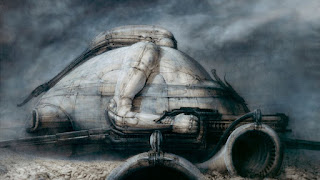Welcome back to Nevermore, where I look at some of the most intriguing films that never quite made it to the big screen. This week, I look at one of the most infamous cases of a film that came close to being made, but ultimately fell through before production could begin. Yes ladies and gents, I am talking about Alejandro Jodorowsky's adaptation of Frank Herbert's Dune. This is perhaps the big daddy of interesting films that were never made, and was even the subject of a 2014 documentary entitled Jodorowsky's Dune. Why is it so important then, I hear you ask? Well, read on if you want to find out..
Background
By 1975, Chilean-French filmmaker Alejandro Jodorowsky had already made a name for himself with films such as El Topo and The Holy Mountain. His ambition was already evident in his surreal and psychedelic filmmaking style, but it would become even more clear after he was hired by a French consortium to direct an adaptation of Frank Herbert's Dune. Dune was already one of the most renowned sci-fi novels of the 20th century at this stage, so Jodorowsky had a lot to handle when he took on the project.
After a lengthy script was written, Jodorowsky set out to assemble his cast and crew. Swiss painter H.R. Giger and acclaimed French artist Moebius were among those chosen for set and character design, with Giger's design for Baron Harkonnen's castle seen below. Dan O'Bannon was in charge of special effects, while the likes of Pink Floyd and Magma were chosen for the music department. As for the cast, well, it would have included the likes of Orson Welles, Udo Kier, Mick Jagger, Jodorowsky's own son Brontis, and strangely enough, Salvador Dalí himself. Dalí was reportedly offered $100,000 per minute of screentime for his role as the emperor, could you imagine? With such a momentous production in mind, it's easy to see how the project eventually fell through, but we'll come to that in a minute..
Plot Details
Now I haven't read Frank Herbert's novel so I can't really give a fully blown synopsis, but I have enough knowledge of it to give a bare bones summary so bare with me. Basically, Dune is set in a complex, interstellar feudal society in the future, where different noble houses control different planets while owing allegiance to the Padishah Emperor. The young Paul Atreides lives with his family on the planet Arrakis after they accept stewardship of it. Arrakis is extremely important due to it being the only source of melange, the galaxies most important resource. Dune essentially follows the struggle for control of Arrakis and deals with various socio-political and religious themes in the process.
Now Jodorowski had never read Dune before pre-production, I'm not sure how much of the novel he eventually read but it's clear that he would only use it as a skeleton for his own project. In actual fact, his vision of Dune would have been, what he describes as, both a religious experience and an LSD trip. The ending in particular would have been vastly different to that of the novel, which ends with the protagonist becoming the new emperor and so on. Jodorowsky's ending would have been vastly different, with the character of Paul Atreides dying before being resurrected in the minds of those who knew him. On top of that, the planet of Arrakis would then morph into some sort of garden-like planet that would then hurl itself across the galaxy, spreading enlightenment on the way. It's a far cry from Herbert's novel, but if Jodorowsky was aiming for an LSD trip than that sounds about right.
So What Happened?
To put a long story short the project failed due to financial reasons, and it doesn't take a rocket scientist to figure out why. Frank Herbert himself stated in 1976 that $2 million of the $9.5 million budget had already been spent in pre-production, and that the script was about "the size of a phone book". It is estimated that the script would have resulted in a 14-hour-long film, so you can see why things didn't pull through. The rights to the film expired in 1982 before being purchased by producer Dino De Laurentiis, who then hired David Lynch to direct and the rest is history. Lynches Dune was then released in 1984, but even Lynch himself wasn't a fan of that iteration.
Despite the disastrous events of Dune, Jodorowski would go on to continue his career with films like Santa Sangre. Several members of the creative team would also go on to have successful careers as well, with Dan O'Bannon famously writing films such as Alien as well as directing Return of the Living Dead. H.R. Giger would also work on Alien, famously designing the films eponymous creature, and his artistic style has become highly influential ever since.
Chances of it Ever Happening:
Jodorowsky's Dune is dead and buried, it will never happen. However, a new adaptation of Dune is currently in the works at Legendary Entertainment, with Forrest Gump screenwriter Eric Roth penning the project and French Canadian filmmaker Denis Villeneuve set to direct. After Villeneuve's work on Blade Runner 2049, I think it's safe to say the project is in good hands.
Jodorowsky's Dune certainly sounded ambitious, but perhaps it was for the best that it never happened. Herbert's work has an extensive fanbase, so if a film adaptation of Dune is to be done, then it should rightly do the novel justice. If you want to know more about Jodorowsky's Dune, then there's a whole documentary on it so I'd suggest checking that out.
Next time on Nevermore, the time that Nic Cage almost became Superman..



No comments:
Post a Comment